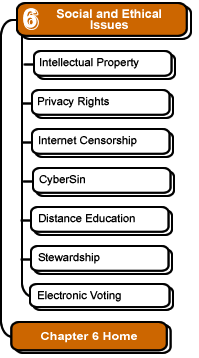

Distance Education
When the computer dominates education, student users may adapt themselves uncritically to the computer's reduced worldview. Whatever does not make it to the computer screen is then simply not considered by the student. Computer programs contain only information that has to do with measurements, sizes, and statistics. Egbert Schuurman, Perspectives on Technology and Culture (Sioux Center, IA: Dordt College Press, 1995) 108. |
Some have predicted that technology in the classroom will revolutionize education. Others have forecast the doom of education once the computer replaces the teacher. Technology can be used in a number of ways in the classroom:
-
individual students can use the computer to look up research information on CD-ROM or on the Web
-
the teacher can use the computer to display images, video, text, and sounds to enhance the instruction
-
students can collaborate with other students in remote locations
-
students can take quizzes online and receive immediate feedback
If technology can revolutionize the classroom, why hasn't it already? Many classrooms in the United States have received a steady influx of technology over a fairly long period of time, and yet it appears that little real improvement has resulted.
Technology adds an additional complication into the learning process that works positively for some but not for all. For the superior student, technology can be assimilated into the learning process with relative ease, contributing to broader and deeper knowledge. However, for the unprepared student with poor motivation or limited attention, technology may actually be a detriment to the educational process. Today's information technology cannot provide the feedback, gentle guidance, and discipline necessary for an errant student.
Borgmann points out another problem with distance education: Billions of dollars are dedicated to educational hardware and software, but next to nothing is spent to get reliable information on the costs and benefits of the expenditures. . . . The rhetoric of recasting education within the framework of information technology is well attuned to the promise of technology and, in fact, to the implementation of that promise. The disburdenment from the constraints of time, place, and the decisions of other people is the unique accomplishment of modern technology and finds its everyday realization in consumption. Supported by the machinery of technology, consumption is the unencumbered enjoyment of whatever one pleases. The pleasures of consumption require no effort and hence no discipline. Albert Borgmann, Holding On to Reality: The Nature of Information at the Turn of Millennium (Chicago: The University of Chicago Press), 207. |
![]()
![]()
These pages were written by Steven H. VanderLeest and Jeffrey Nyhoff and edited by Nancy Zylstra
©2005 Calvin University (formerly Calvin College), All Rights Reserved
If you encounter technical errors, contact computing@calvin.edu.